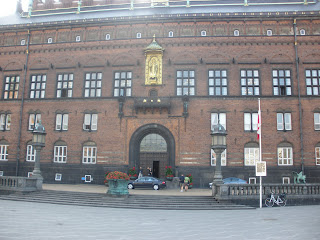Sunday, December 20, 2009
COP15 was A Tale of Two Speeches
Monday, December 14, 2009
COP15 is The Copenhagen Debacle?
Note: This post can also be found at http://sscinternational.org/
In terms of excitement, the first day of week two may surpass all five days of week one combined. Before lunch. The Group of 77 and China have halted formal negotiations over concerns that the Kyoto Protocol will be abandoned, and COP President Connie Hedegaard was a no-show for her scheduled briefing with youth as she (we assume) attempts to pick up the pieces.
In other news, rumors have been flying via email, twitter and the web that Canada has announced a courageous emissions reduction target of 40% of 1990 levels by 2020, 80% by 2050 and 5% of GDP annually by 2030 in financing. As of right now, I'd say that it looks like a stunt (props to Osman Faruqi for pointing out discrepancies between the WSJ site and the link site) possibly perpetrated by those devious activists the Yes Men. The truly sad part is how quickly people jumped to this conclusion. Is the idea that developed nations will step up with the actions this planet requires so completely far-fetched?
Finally, word has come down from the Secretariat that Observers (NGOs and IGOs) will be severely restricted in their access to the Bella Center for the rest of the week. Allegedly, only 90 (!) civil society delegates (out of around 7000 present today) will be allowed inside on Friday. Apparently CAN (Climate Action Network–the association of environmental NGOs) will be meeting with the UNFCCC people to register their complaints about how this action taints the entire Copenhagen process. Anybody want to bet on whether this appeal will be successful?
Considering these facts (huge and still growing division between developed/developing, no ambition from Annex I, poor logistical management by UNFCCC/hosts), I think it's fair to ask whether this conference will ultimately be viewed as a huge failure. And, of course, who will shoulder the blame. Obviously the finger pointing will know no bounds, but perhaps the nation with the most to lose is little old Denmark. This government has staked a lot on getting something (increasingly: anything) out of this conference. For this reason, and the fact that the numerous visiting heads of state don't wont to return home empty-handed, I'm guessing we will see some sort of agreement by the end of the week. But I'm becoming more and more afraid that this agreement will be weak and ultimately meaningless.
I hate being pessimistic, but it just doesn't seem like anybody (except maybe the small island states) are willing to do what it takes. May the leaders of this troubled world prove me wrong.
Saturday, December 12, 2009
COP15 is a Wild Ride
This is from a protest at an Americans for Prosperity event that I attended, although I'm not in this picture. AFP is a "tea-party" type organization that doesn't believe in man-made global warming. They held this event at the Copenhagen Marriott and were broadcasting it back to the U.S. when a bunch of US youth in the audience stood up and began calling for clean energy and climate change mitigation. The event has gotten way more press than we expected, mainly because the scheduled speaker, a British climate change denier named Lord Monckton, called us "Hitler Youth" during and after the protest. Here's the video. There's also been articles in The Guardian (UK) and on Huffington Post.
Monday, December 7, 2009
Denmark is Hosting the World
Sunday, November 22, 2009
Denmark is Good Eats
Monday, November 9, 2009
Denmark is Only a Few Hours from Berlin
Thursday, November 5, 2009
Denmark is Fundraising
As most of you know, I've been selected to be a member of the Sierra Club's student delegation to the UN Climate Change Conference taking place this December in Copenhagen. Myself and 19 other young people from around the United States will be able to attend negotiation sessions in which governments will attempt to reach an agreement on how to combat climate change.
I'm in the fortunate situation of not needing a plane ticket to Denmark or a place to stay while I'm here, but the same can't be said for the rest of the delegates. With that in mind, I'm helping the group raise money to offset their expenses. A plane ticket costs anywhere from $600-$800 and the group will need to pay for accommodations and food as well.
If you would like to help a wonderful group of young people realize their dream of preserving the planet for future generations, please make a contribution to this group.
I've created a website:
http://danielhc.chipin.com/sierra-student-coalition-delegation-to-cop15
that will allow you to make a donation with your credit card. Considering my location, I think this will be the easiest way to do things. The donation goes straight to my PayPal account, and I will then transfer the money to the group.
Thank you so much and I promise that I will post a *real* blog entry in the near future.
Daniel
P.S. I'll probably be sending out an email with a similar message, so I apologize in advance if you have to read this twice.
Wednesday, October 28, 2009
Denmark is A Lot of Work
Tuesday, October 20, 2009
Denmark is a Case of the Mondays

Thursday, October 8, 2009
Denmark is Round Churches
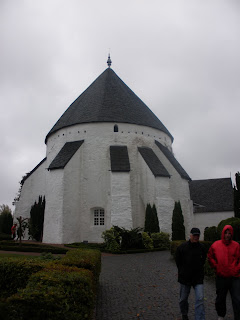
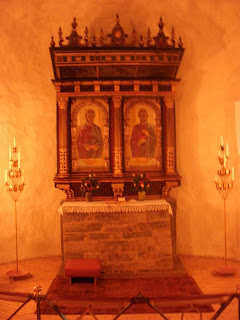
Sunday, September 27, 2009
Denmark is Tour de Boserup


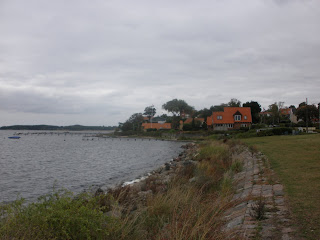







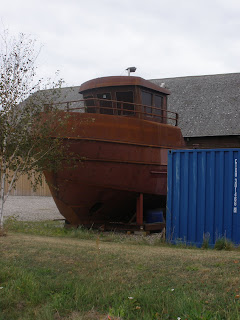









Monday, September 21, 2009
Denmark is Grundtvig
Sunday, September 13, 2009
Denmark is Doing something about it
Saturday, September 5, 2009
Fact 2: Denmark is windy
Sunday, August 30, 2009
Some pics from around Copenhagen
Saturday, August 29, 2009
Fact 1: Denmark is old
As an unabashed history geek, you can understand how awesome it was to be having a three-course dinner in a 600 year-old building.* Conversation topics at my table of three American Fulbrighters, one Danish staff member and two Danish board members ranged from European integration to Danish women's handball to the American health care debate (you can't escape it...) After many toasts (Skal!) and many laughs we parted ways. I was hoping to see the spirit of the thieving orphan girl on my out, but had no such luck. I'm sure there will be many more chances to see the ghosts of Denmark's long and storied past during the coming year.
http://www.admiralgjeddesgaard.dk/index.php?id=13
*The original building burned down in 1728, so technically I was only eating in a 250 year old structure. But really.
Welcome!
Daniel
























